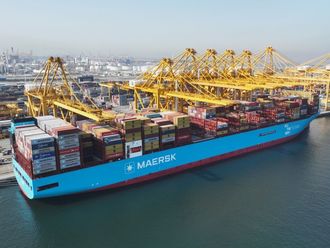London: Oil fell amid speculation that some major oil producers, including Opec members, are not planning to join an output freeze aimed at stabilising prices.
Futures fell 1.5 per cent in New York after fluctuating earlier in the day following explosions at the airport and subway in Brussels. Libya will skip an oil producers’ meeting to discuss an output freeze in Doha on April 17, according to a person familiar with the matter. About 15 or 16 nations will attend the discussions in Qatar’s capital, said Abdullah Al Badri, secretary-general of the Organisation of Petroleum Exporting Countries.
The recent move lower is probably related to reports that Libya won’t be joining the Doha talks, Giovanni Staunovo, an analyst at UBS Group AG, said by e-mail, adding that expectations for the meeting had been rising in recent weeks. Each country which can increase production has minimal incentive to participate, with the exception of Saudi Arabia.
Oil slumped to a 12-year low this year before rising on speculation that stronger demand and falling US output will ease a global surplus. The drop in output outside Opec and a decline in US drilling shows the group’s strategy of letting the market rebalance itself is working, Al Badri said in Vienna Monday. US crude stockpiles are forecast to have risen last week, keeping supplies at the most since 1930.
West Texas Intermediate for May delivery fell 62 cents to $40.90 a barrel on the New York Mercantile Exchange at 9:24 am local time. Total volume traded was about 26 percent below the 100-day average. The April contract increased 47 cents to close at $39.91 a barrel on Monday.
Brent for May settlement was 43 cents lower at $41.11 a barrel on the London-based ICE Futures Europe exchange. The contract rose 34 cents, or 0.8 percent, to $41.54 Monday. The global benchmark crude traded at a premium of 18 cents to WTI.
Saudi Arabia will join a meeting of producers from within and outside Opec in Doha next month, adding weight to the campaign by financially stricken crude exporters to freeze output and overcome the glut that’s weighing on the market. Nigeria will also attend, a person familiar with the matter said Monday.
While all Opec members have been invited to the freeze talks in Doha next month, not all will attend, Al Badri said.
Iran has some conditions related to its own production and it’s up to them whether they participate in the accord, or even opt to join in at a later date, he said. Iran previously described the proposal to freeze oil output as ridiculous. The country is attempting to regain its lost market share following the end of sanctions.
Libya is also seeking to increase its oil production, which has fallen by about 75 per cent in the last five years following a civil war and prolonged violence between rival governing factions.
Brazil won’t join the meeting, the energy ministry said Monday by e-mail. Argentina isn’t planning to send a delegation, Juan Jose Aranguren, the nation’s Energy & Mining Minister, said Monday in an e-mail.
The Belgian capital was on the highest alert level after 26 people were killed and more than 100 were injured after bombs exploded at its airport and its subway network.












